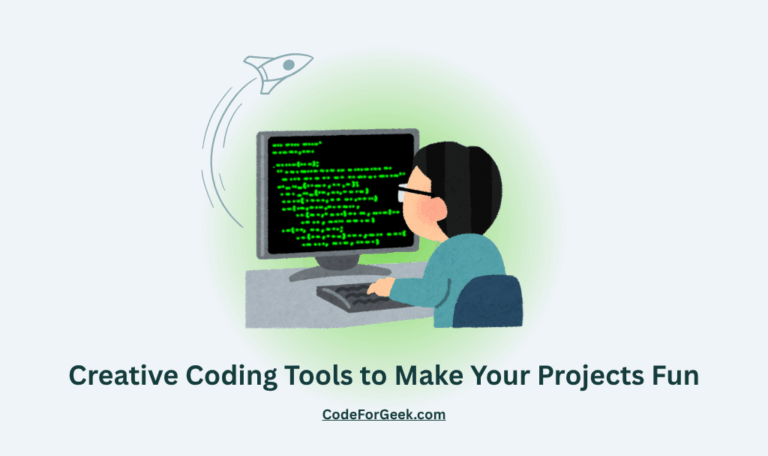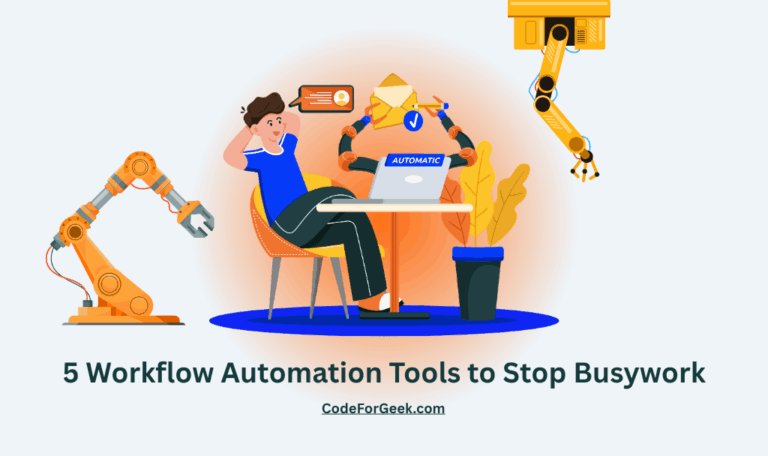New to Rust? Grab our free Rust for Beginners eBook Get it free →
Top CoRover Alternatives for Customer Service (2026 Update)
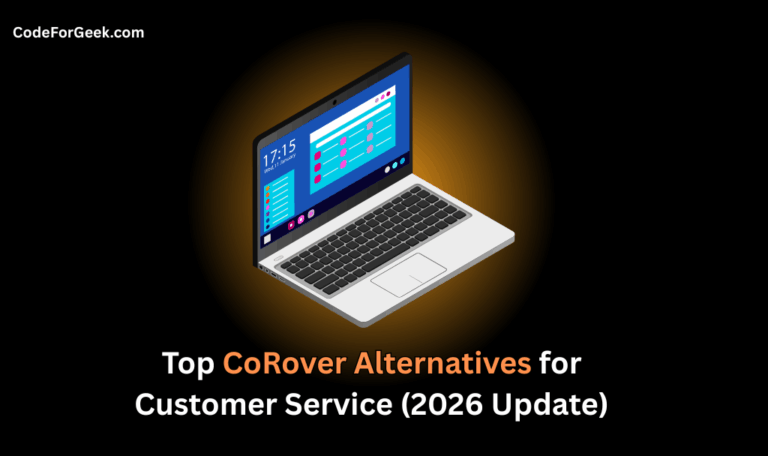
CoRover has built a strong name in multilingual customer support, especially in Asia, powering chat, voice, and even video bots for enterprises and government projects. I have seen it in large deployments like railways, banks, and telecoms, where language diversity is a big challenge.
But that doesn’t mean CoRover is for everyone. It’s enterprise-heavy, pricing isn’t transparent, and its BharatGPT models are still catching up for international use.
So here are some of its alternatives that will be trending in customer support in 2026.
10 Best CoRover Alternatives
1. Avaamo
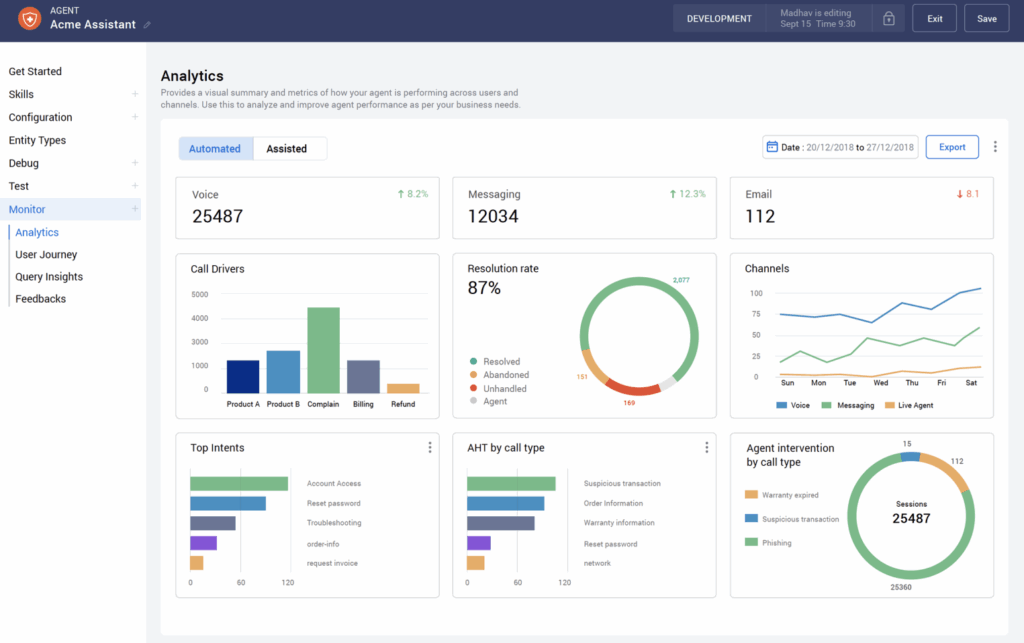
Avaamo focuses on regulated sectors like banking, healthcare, and insurance — exactly where CoRover often plays. It supports multilingual chat + voice and offers strict compliance out of the box.
Key Features:
- Vertical AI Models: Pre-trained for finance, healthcare, insurance, and HR.
- No-Code Builder: Visual designer to create workflows without coding.
- Multilingual Support: 100+ languages and dialects for global deployments.
- Voice + Chat: Works across SMS, IVR, mobile, and web channels.
- Enterprise Integrations: 1,000+ connectors for CRM, ERP, ITSM, and more.
- Security & Compliance: SOC2, HIPAA, and GDPR ready with role-based access.
Pros:
- Industry-Specific Expertise: Comes ready with models for regulated sectors.
- Strong Automation: Handles complex queries with high accuracy.
- Flexible Deployment: Cloud or on-premise options.
- Comprehensive Analytics: Tracks containment, CSAT, and intent failures.
- Scalable: Supports large enterprises with high volumes.
Cons:
- Premium Pricing: Aimed at large enterprises only.
- Complex Setup: Deep integrations require technical expertise.
- Steep Learning Curve: Non-technical teams may need support.
- Cross-Channel Context: Conversations do not always carry over seamlessly.
Pricing:
| Plan | Price | Core Features |
|---|---|---|
| Custom | Quote-based | Enterprise deployment, vertical AI models, omnichannel support, etc. |
Best For:
Enterprises needing multilingual, compliant, and domain-specific automation.
2. Boost.ai
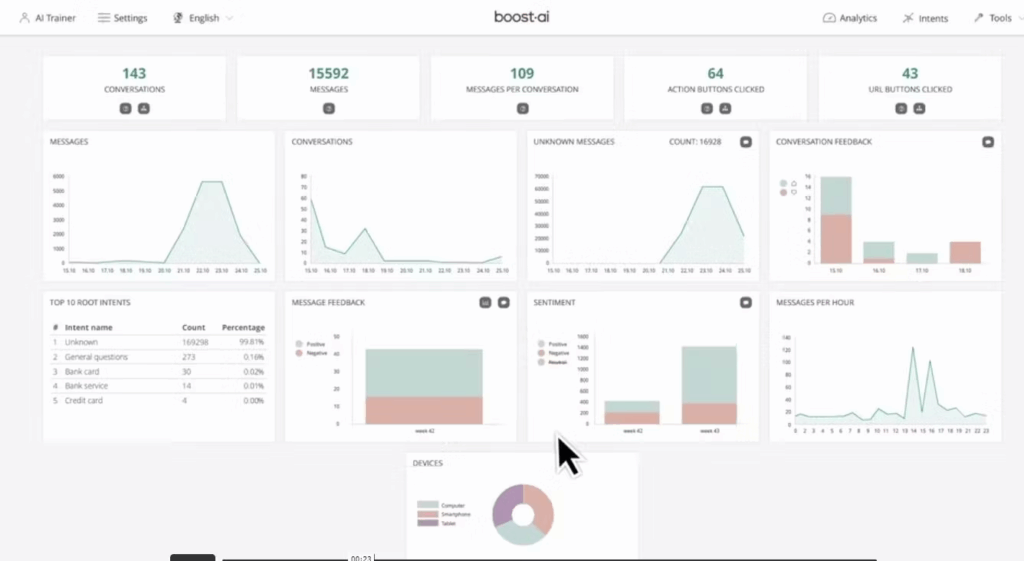
Boost.ai delivers precise, high-control virtual agents that can scale globally. Compared to CoRover, it’s better for teams prioritising accuracy and integration depth over multilingual expansion.
Key Features:
- Hybrid AI: Combines rules with NLU and large language models for precise control.
- No-Code Builder: Slack-style interface for training intents and flows.
- Self-Learning AI: Improves continuously from agent interactions.
- Omnichannel Support: 35+ channels and 100+ languages supported.
- Compliance: ISO27001, GDPR, SSO, and on-premise options.
- Agent Assist: Suggests replies and context for human agents in real time.
Pros:
- High Accuracy: Delivers reliable responses in regulated industries.
- User-Friendly: Simple interface for non-technical staff.
- Fast ROI: Pre-trained content helps bots go live quickly.
- Scalable: Handles thousands of simultaneous conversations.
- Enterprise Focus: Strong support and co-creation with clients.
Cons:
- Premium Cost: Aimed at large enterprises with bigger budgets.
- Interface Gaps: Admin tools for large intent sets can feel clunky.
- Language Coverage Limits: Some niche languages require extra work.
- Mobile UI Issues: Minor glitches reported on certain iOS apps.
Pricing:
| Plan | Price | Core Features |
|---|---|---|
| Custom | Quote-based | Hybrid AI, no-code builder, compliance features, omnichannel support, etc. |
Best For:
Large organisations needing reliable AI chat with tight compliance and performance guarantees.
3. Cognigy
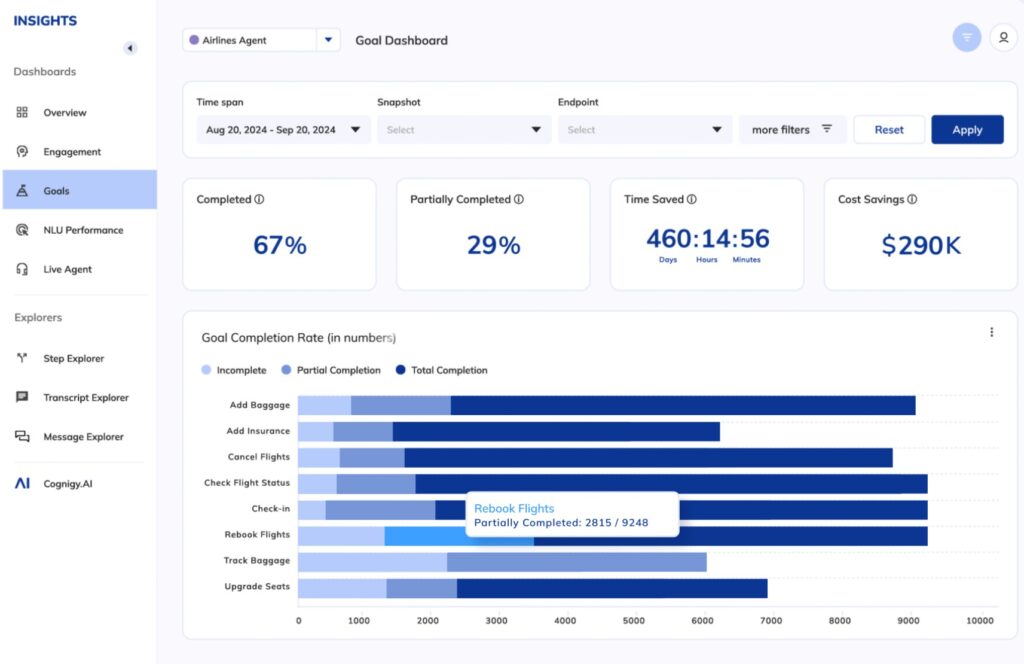
Cognigy excels at voice + chat orchestration across enterprise channels. It offers stronger backend integration than CoRover and suits companies running contact-centre-scale automation.
Key Features:
- Low-Code Builder: Visual editor to design conversation flows without coding.
- Omnichannel Support: Works on chat apps, web, voice, and messaging platforms.
- Advanced NLU: Detects intents in 100+ languages with high accuracy.
- Enterprise Integrations: Connects to CRM, ERP, IT systems, and APIs.
- Human Handoff: Seamless transfer to agents with full context.
- Analytics: Dashboards to track performance, drop-offs, and sentiment.
Pros:
- Highly Flexible: Can build anything from simple FAQs to complex workflows.
- Enterprise-Grade: Scales for high-volume global organisations.
- Voice Support: Strong speech recognition and text-to-speech features.
- Multi-Language: Supports localisation for international use.
- Compliance Ready: ISO, SOC 2, HIPAA, and GDPR certifications.
Cons:
- High Pricing: Enterprise-level cost, not suitable for small businesses.
- Learning Curve: Requires technical skill for advanced use.
- Resource Intensive: Full deployment needs planning and team effort.
- Limited Community: Smaller knowledge base compared to bigger vendors.
Pricing:
| Plan | Price | Core Features |
|---|---|---|
| Custom | Quote-based | Low-code builder, omnichannel support, enterprise integrations, analytics, etc. |
Best For:
Global enterprises with complex workflows or heavy voice support needs.
4. Aisera
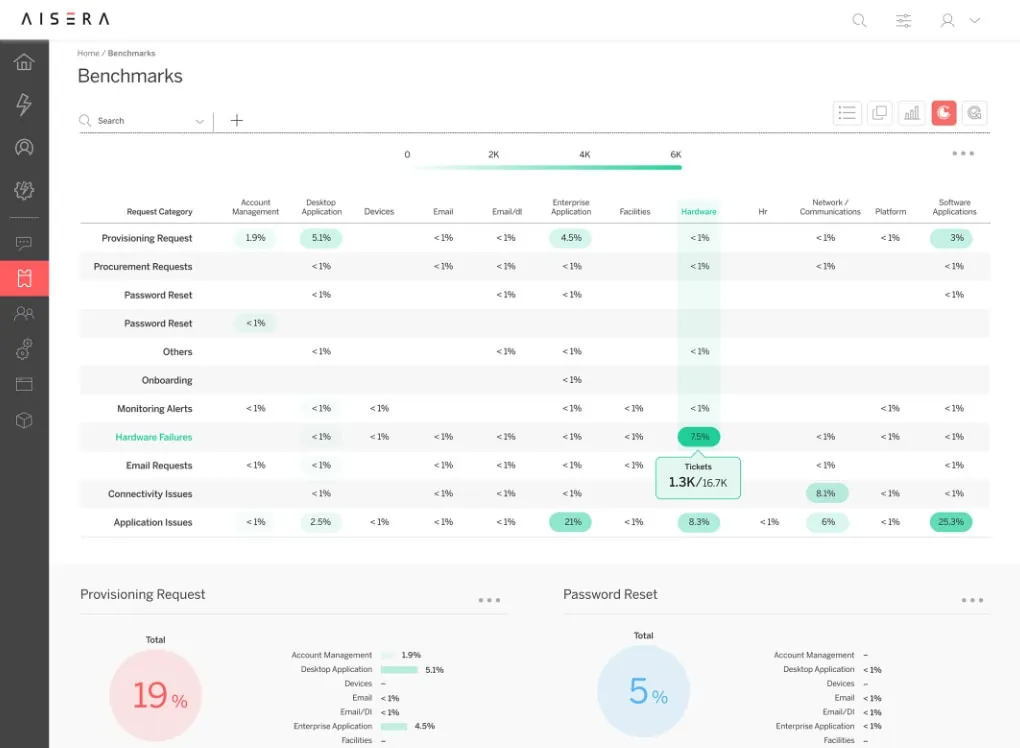
Aisera goes beyond chatbots — it’s a unified service-desk automation layer that handles IT, HR, and customer support through workflows and AI actions.
Key Features:
- Unified AI Service Desk: One virtual agent for IT, HR, and support requests.
- Workflow Automation: Handles tasks like password resets and license provisioning.
- Multi-Channel Support: Works across chat, voice, email, and collaboration apps.
- Knowledge Search: AI-driven search across FAQs, tickets, and documents.
- Agent Assist: Suggests next-best actions and answers to live agents.
- Integrations: 75+ certified connectors with ITSM, CRM, and IAM systems.
Pros:
- High Auto-Resolution: Resolves up to 80% of routine queries.
- Cross-Department Use: Consolidates IT, HR, and support into one AI layer.
- Vendor-Agnostic: Works alongside existing platforms.
- Fast Deployment: Pre-trained intents allow quick setup.
- Scalable: Expands coverage with minimal retraining.
Cons:
- Enterprise Pricing: Suited only for large organisations.
- Implementation Effort: Requires setup and data preparation.
- Admin Learning Curve: Workflow and analytics need training.
- Monitoring Needed: AI-driven actions require oversight to build trust.
Pricing:
| Plan | Price | Core Features |
|---|---|---|
| Custom | Quote-based | Unified AI desk, workflow automation, multi-channel support, integrations, etc. |
Best For:
Enterprises seeking a single AI platform for both internal and external automation.
5. Zendesk
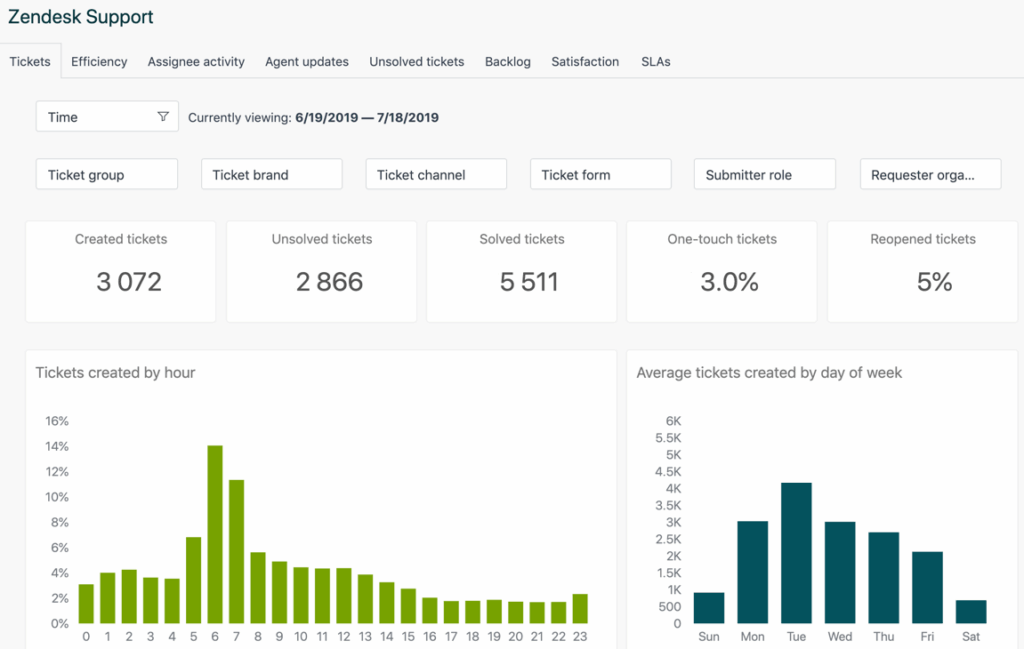
Zendesk provides the omnichannel foundation many AI tools connect to. It’s not as “AI-native” as CoRover, but it’s rock-solid for structured support and analytics.
Key Features:
- Omnichannel Ticketing: Centralises email, chat, phone, and social into one ticketing hub.
- AI and Automation: Bots, routing, and workflows to cut manual effort.
- Integrated Voice: Built-in call centre with IVR, call recording, and voicemail.
- Analytics & Reports: Dashboards and custom metrics for SLA, CSAT, and team performance.
- Marketplace: 1,000+ integrations with CRMs, ecommerce, and productivity apps.
Pros:
- Comprehensive Suite: Covers tickets, chat, phone, and self-service.
- Automation Strength: Improves productivity and resolution speed.
- Advanced Analytics: Tracks KPIs and service quality effectively.
- Flexible Setup: Wide configuration and integration options.
Cons:
- High Pricing: Advanced features require costly tiers.
- Steep Learning Curve: Complex UI needs proper training.
- Developer Dependence: Customisation often requires technical support.
- No Free Plan: Only a limited trial is available.
Pricing:
| Plan | Price (per agent/month) | Core Features |
|---|---|---|
| Support Team | $19 | Email, ticketing, Facebook/X support, analytics dashboards, etc. |
| Suite Team | $55 | AI agents, generative replies, knowledge base, chat, social messaging, etc. |
| Suite Professional | $115 | Multiple help centres, advanced reporting, CSAT surveys, SLA management, IVR, etc. |
| Suite Enterprise | $169 | 300 help centres, sandbox, custom roles, audit logs, advanced security, etc. |
Best For:
Enterprises wanting a proven, auditable ticketing backbone with room to plug in AI later.
6. Intercom
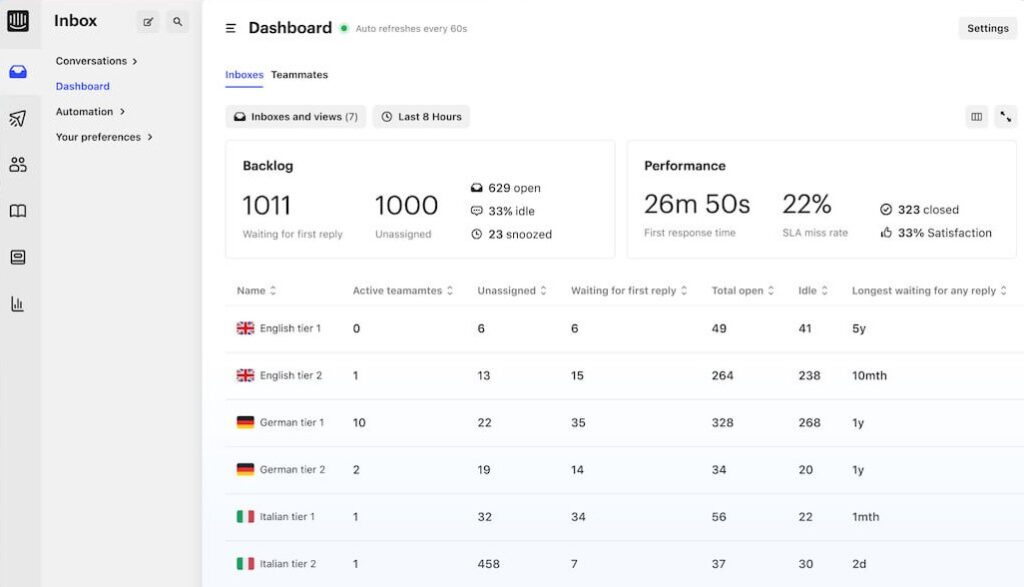
Intercom leads with product-embedded chat and automation, focusing on customer experience inside apps. It’s faster to launch and more user-friendly than CoRover.
Key Features:
- Messenger: In-app and web chat widget with user data and context.
- Fin AI Agent: GPT-4 powered bot that answers FAQs from your knowledge base.
- Outbound Campaigns: Targeted messages for onboarding and updates.
- Shared Inbox: Unified email and chat inbox with assignments.
- Knowledge Base: Help centre and product tours to reduce ticket load.
Pros:
- Real-Time Engagement: Excellent in-app chat experience.
- Personalisation: Segments and targets messages by user data.
- Unified Platform: Handles both support and customer outreach.
- Clean Interface: Easy for teams to learn and use daily.
- Strong Ecosystem: Integrates with CRMs and analytics tools.
Cons:
- High Pricing: Per-seat costs and usage fees rise quickly.
- Unpredictable Billing: AI resolution charges can spike costs.
- Limited for Small Teams: Overkill for startups or small businesses.
- Marketing Gaps: Advanced marketing features require third-party tools.
Pricing:
| Plan | Price (per seat/month) | Core Features |
|---|---|---|
| Essential | $29 | Messenger, Fin AI Agent, shared inbox, help centre, reports, etc. |
| Advanced | $85 | All Essential + workflows, multiple inboxes, private/multilingual help centre, etc. |
| Expert | $132 | All Advanced + SSO, HIPAA, SLAs, multibrand support, etc. |
Best For:
SaaS and product-led companies that want AI chat directly in-product.
7. Freshworks
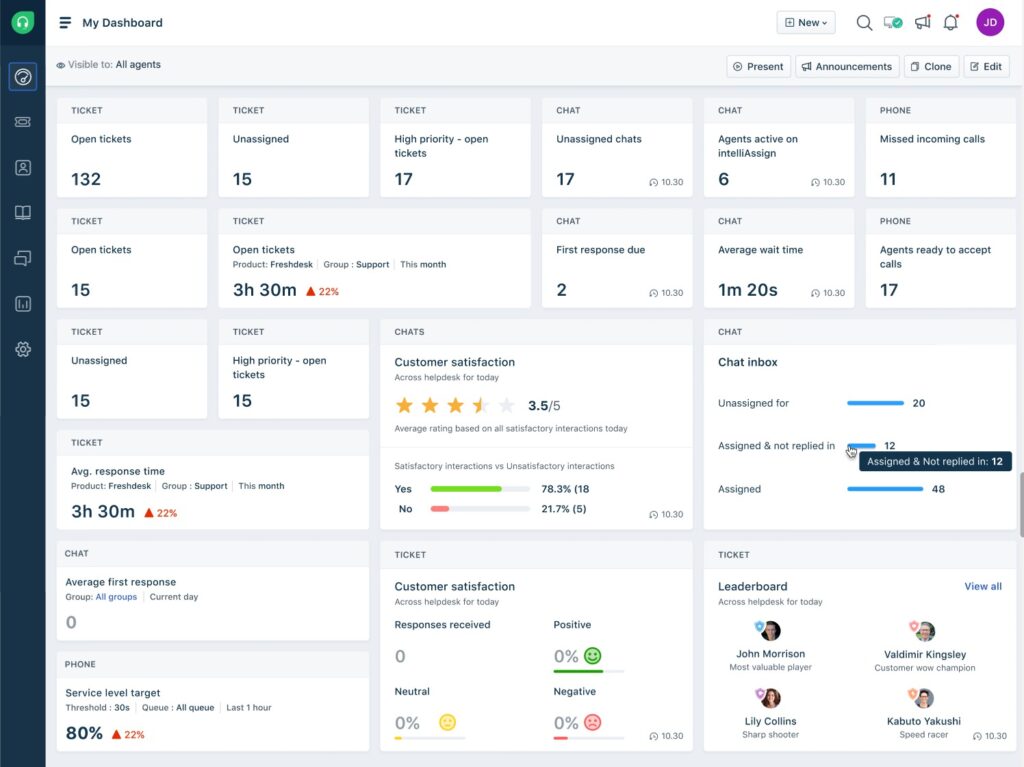
Freshworks is the affordable all-in-one alternative, bundling helpdesk, chat, and AI (Freddy AI). It’s lighter, simpler, and ideal for small to midsize teams.
Key Features:
- Omnichannel Inbox: Collects email, chat, and social messages into one place.
- Freddy AI: Suggests replies, automates workflows, and powers chatbots.
- Knowledge Base: Customisable help centre with FAQ suggestions.
- Collaboration Tools: Internal notes and automated rules to manage tickets.
- Unified View: CRM-lite profiles showing history, sentiment, and CSAT.
Pros:
- Easy Setup: Teams can go live in days without heavy onboarding.
- Affordable Pricing: Free plan and low-cost tiers for startups.
- Friendly UI: Clean dashboard that is simple for agents to navigate.
- All-in-One Option: Freshdesk, Freshchat, and Freshcaller work together smoothly.
Cons:
- Limited Customisation: Less flexible for complex enterprise workflows.
- Multiple Modules: Using different Freshworks products can feel fragmented.
- Performance Lags: Small slowdowns during heavy use.
Pricing:
| Plan | Price (per agent/month) | Core Features |
|---|---|---|
| Growth | $15 | Ticketing, inbox, tasks, customer portal, etc. |
| Pro | $49 | Multilingual support, custom objects, advanced reporting, etc. |
| Pro + AI | $78 | All Pro + Freddy AI Copilot and AI Insights, etc. |
| Enterprise | $79 | Advanced security, audit logs, workflows, etc. |
Best For:
Startups and SMBs needing quick-start omnichannel automation on a budget.
8. LiveChat
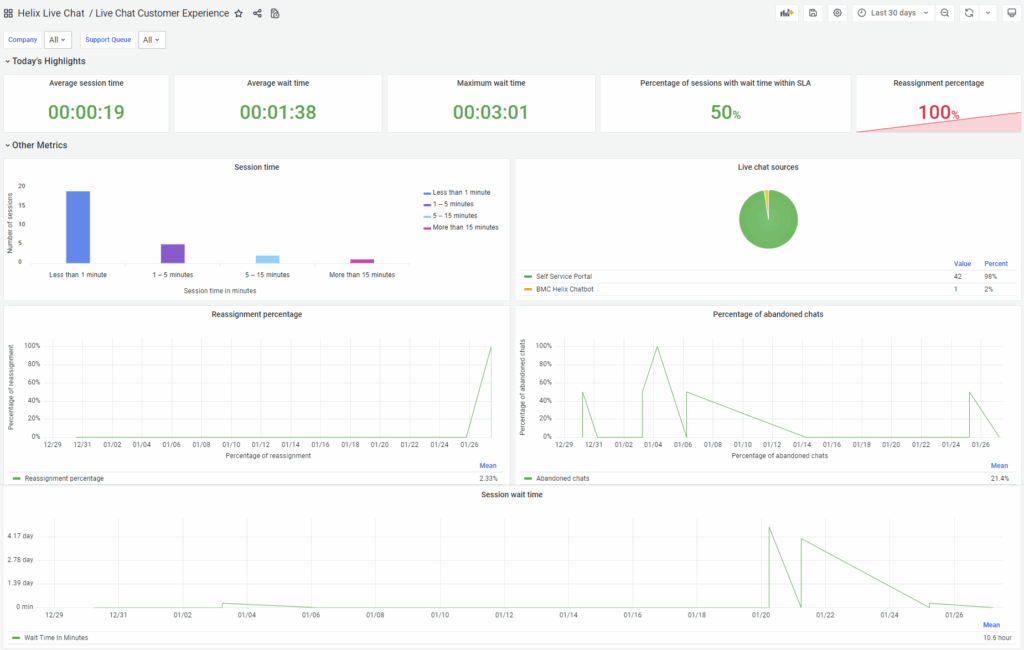
LiveChat stays focused on real-time human chat. It’s not AI-heavy, but it’s unbeatable for direct customer conversations that need speed and personal touch.
Key Features:
- Real-Time Chat: Smooth widget with typing preview and user context.
- Agent Productivity Tools: Canned responses, chat routing, and multi-chat handling.
- Customisable Widget: Brand colours, logos, and triggers for proactive chats.
- Chatbot Integration: Bots to handle FAQs before escalating to agents.
- Analytics: Post-chat surveys and dashboards to track agent performance.
Pros:
- Excellent Chat UX: Optimised for real-time conversations.
- Quick Setup: Easy script or plugin installation for websites.
- Conversion Triggers: Smart greetings like “Need help?” at checkout.
- Flexible Branding: Fully customisable chat design.
Cons:
- Not a Full Helpdesk: Limited tools for complex ticket workflows.
- Costs Rise With Agents: Pricing can grow quickly per seat.
- Bot Add-On: AI chatbot is a separate service.
- Lower Plans Limited: Entry tiers restrict features and history.
Pricing:
| Plan | Price (per person/month) | Core Features |
|---|---|---|
| Starter | $19 | Basic chat widget, text intelligence, 60-day history, etc. |
| Team | $49 | Unlimited chat history, customisation, reporting, etc. |
| Business | $79 | Advanced reporting, staffing prediction, SMS support, etc. |
| Enterprise | Custom | White-label, SSO, HIPAA compliance, dedicated manager, etc. |
Best For:
E-commerce and B2B teams that rely on live engagement to close deals or solve issues quickly.
9. LiveChatAI
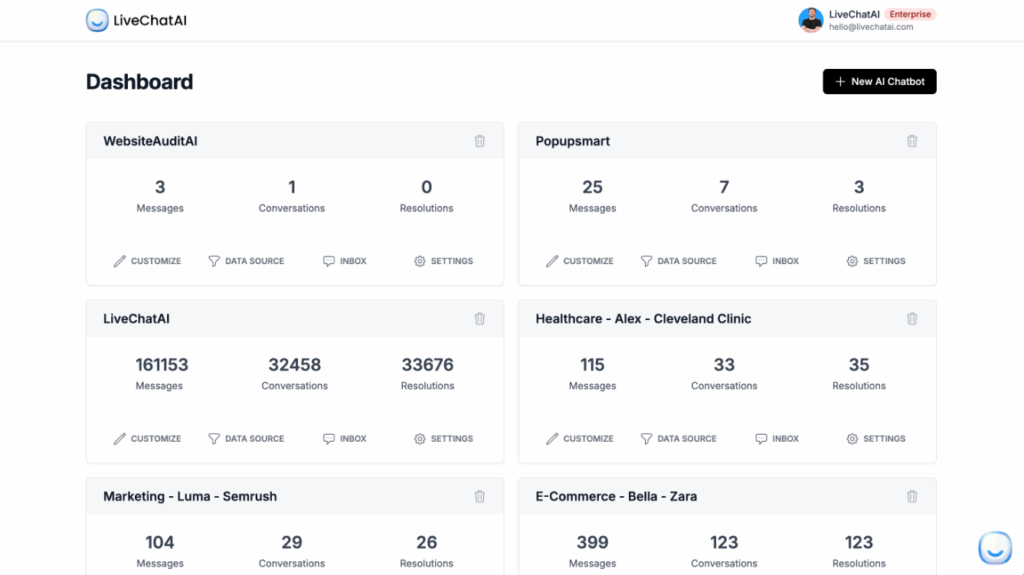
LiveChatAI merges AI automation with human fallback — covering websites, WhatsApp, and Shopify. It’s quicker to set up and more flexible for non-technical teams.
Key Features:
- Dual Response: AI resolves FAQs and passes complex queries to humans.
- Seamless Handoff: Transfers to your team via Intercom, WhatsApp, SMS, or email.
- Knowledge Training: Learns from FAQs, documents, and website content.
- Multi-Channel Deployment: Works on websites, WhatsApp, Shopify, Slack, and WordPress.
- AI Actions & API: Can reset passwords, check orders, or book appointments.
- Analytics: Monitors resolution rates, response times, and satisfaction.
Pros:
- Balanced Support: Automation plus human backup keeps quality high.
- Cost Savings: Reduces repetitive queries so agents focus on complex cases.
- User Experience: Smooth transition between AI and human agents.
- Channel Reach: Covers web chat and popular messaging apps.
- Quick Setup: Templates and knowledge uploads make deployment faster.
Cons:
- Outsourced Handoff: Using external agents may raise quality or privacy concerns.
- Pricing Complexity: Costs vary by usage and added services.
- Integration Effort: Requires setup for CRM or workflow connections.
- Smaller Ecosystem: Newer platform with fewer third-party references.
Pricing:
| Plan | Price | Core Features |
|---|---|---|
| Free | Free | 250 messages, 1 chatbot, live chat, basic analytics, etc. |
| Basic | $390 | 4,000 messages, 1 chatbot, live chat, contacts, etc. |
| Pro | $890 | 10,000 messages, 2 chatbots, AI actions, API access, etc. |
| Advanced | $1,890 | 15,000 messages, 5 chatbots, WhatsApp integration, advanced models, etc. |
| Expert | $3,890 | 20,000 messages, 10 chatbots, more seats, advanced analytics, remove branding, etc. |
Best For:
Companies needing 24/7 support automation without the cost or complexity of enterprise AI.
10. DeepConverse
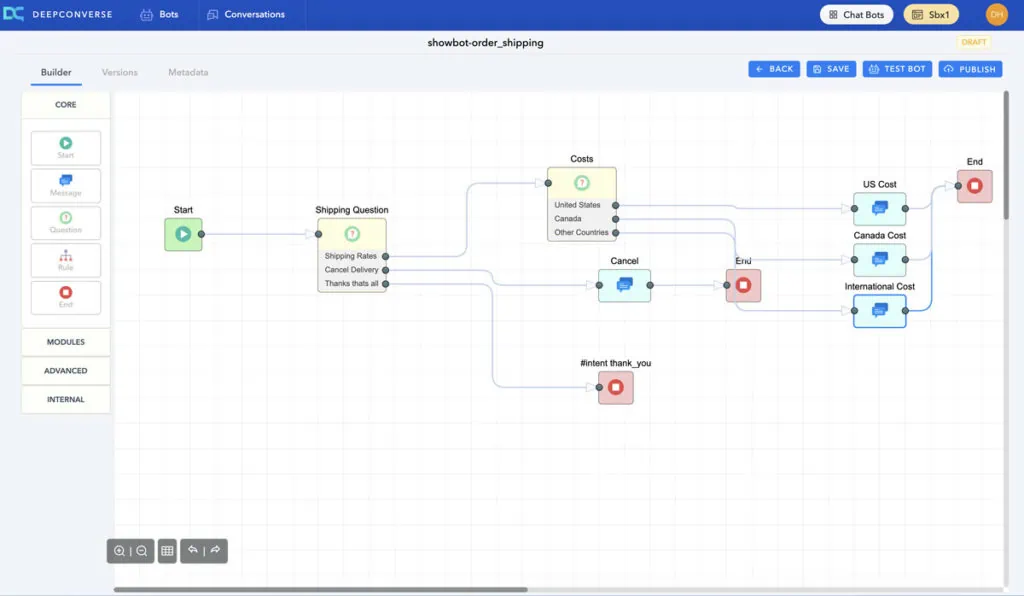
DeepConverse connects natively with Zendesk and Salesforce, automating Tier-1 queries through guided flows and knowledge-base lookups.
Key Features:
- Helpdesk Integration: Connects natively with Zendesk and Salesforce for tickets and knowledge articles.
- Generative Answer Engine: Pulls accurate answers directly from FAQs and manuals.
- Interactive Guides: Step-by-step workflows for troubleshooting and Tier 1 automation.
- No-Code Builder: Drag-and-drop interface to design chatbot flows without coding.
- Analytics: Tracks deflection rates, resolution quality, and satisfaction scores.
Pros:
- Plug-and-Play: Works seamlessly with existing helpdesk tools.
- Fast Deployment: Easy setup with templates and no-code builder.
- High Automation: Handles repetitive queries and reduces agent workload.
- Multi-Channel Support: Works on web, mobile, and social platforms.
Cons:
- Zendesk-Centric: Best for Zendesk users; others may require more setup.
- Smaller Market Presence: Less recognition compared to larger vendors.
- Mobile SDK Gaps: Limited standalone mobile SDK options.
Pricing:
| Plan | Price | Core Features |
|---|---|---|
| Base Plan | ~$52/month | Zendesk integration, knowledge base answers, templates, etc. |
| Custom | Quote-based | Advanced flows, analytics, integrations, etc. |
Best For:
Teams already using major helpdesks who want plug-and-play automation.
Popular Customer Support Comparison Table
| Tool | Best For | Key Strength | Compliance & Scale | Pricing Starts At |
|---|---|---|---|---|
| Avaamo | Regulated industries | Multilingual AI + voice + compliance | SOC 2, HIPAA, GDPR | Custom |
| Boost.ai | Enterprise automation | Hybrid AI + rule-based control | ISO 27001, GDPR | Custom |
| Cognigy | Global voice + chat automation | Low-code builder, deep integrations | SOC 2, HIPAA, GDPR | Custom |
| Aisera | Unified AI service desk | Workflow automation + multi-dept use | SOC 2, GDPR SSO | Custom |
| Zendesk | Omnichannel foundation | Ticketing + analytics + AI plug-ins | SOC 2, GDPR | $115 / agent / mo |
| Intercom | SaaS & digital-first | Fin AI Agent + in-app messenger | GDPR ready | $29 / seat / mo |
| Freshworks | Startups & SMBs | All-in-one suite + Freddy AI | ISO 27001, GDPR | Free / $15 / agent / mo |
| LiveChatAI | Fast AI setup + human fallback | Multi-channel AI chat automation | Cloud security + encryption | Free / $39 / mo |
| DeepConverse | Zendesk / Salesforce users | No-code flows + knowledge integration | GDPR, SOC 2 | ~$52 / mo |
| LiveChat | Real-time support | Human chat + conversion triggers | GDPR ready | $19 / agent / mo |
That’s it for this article. Hope you found it useful and discovered the right alternative for your business.

